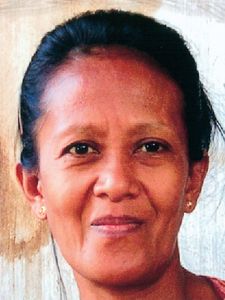 The Ulumanda people live in the province of West Sulawesi. This area is mountainous and rich in raw materials such as minerals, rattan, and ebony wood. The Ulumanda are closely related to the Bungku people who live in the Poso regency of the South Sulawesi province. Many believe that the Ulumanda are descendants of the Bungku people groups who migrated to West Sulawesi. The Ulumanda are also called Ulumandak, Ulunda, and Kayo.
The Ulumanda people live in the province of West Sulawesi. This area is mountainous and rich in raw materials such as minerals, rattan, and ebony wood. The Ulumanda are closely related to the Bungku people who live in the Poso regency of the South Sulawesi province. Many believe that the Ulumanda are descendants of the Bungku people groups who migrated to West Sulawesi. The Ulumanda are also called Ulumandak, Ulunda, and Kayo.
Their everyday language is the Ulumanda language. It has three dialects: Sondoang, Tappalang, and Botteng. The Ulumanda language is part of a larger language group called the Pitu Ulunna Salu sub-family, which also includes the Bambam, Dakka and Pannei languages.
What are their lives like?
The Ulumanda’s main occupation is farming rice (their staple crop), corn, potatoes, and sago. Some Ulumanda gain their livelihood from gathering and marketing resin and rattan. Most Ulumanda on the coast work as fishermen. The soil in Ulumanda is less fertile than in other areas of West Sulawesi.
In the past, there were two classes in the Ulumanda society: the upper class (tribal chiefs and nobility) and the common people. Today, the Ulumanda choose their village leader from the higher caste.
In reality, there are three leaders in a village: the leader chosen by the government, the cultural leader, and the spiritual leader. In many cases, the Ulumanda villages are self-governing. If there is a crime or offense, payment is often demanded in the form of a valuable animal or possession. Sometimes offenders pay by transferring ownership of a plot of coconut farmland. The payment often depends on the economic situation of the offender.
In the past, marriages were arranged, but Ulumanda young people now choose for themselves. However, the man’s payment of a bride price is often more than a year’s wages, and the cost of the wedding ceremony is very expensive. The woman’s family does not pay anything. For this reason, many young people elope to nearby villages. If they marry in their home village, the ceremony takes place in the woman’s house.
What are their beliefs?
Currently, all Ulumanda people are Muslim. However, traditional animistic beliefs are still strong in daily life. The Ulumanda society is a traditional system that is filled with prohibitions and taboos that are still rigorously followed by the vast majority of the people. The services of a dukun (shaman) are sought for many purposes, including healing sicknesses and exorcising evil spirits.
What are their needs?
The Ulumanda people need help with agricultural training on technical tools. This would make their harvests can be more plentiful. Also, the abundance of raw materials in their area needs professional management. Development and training in human resources is another need. Efforts are needed to empower the handicraft industry (especially ebony carvings) so these workers can receive fair market value for their products.
Leave a Reply